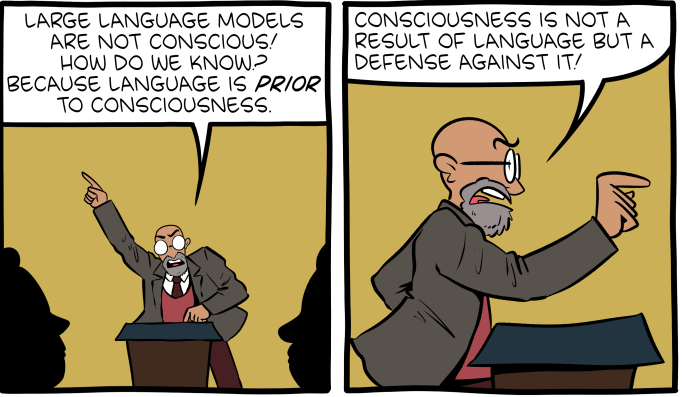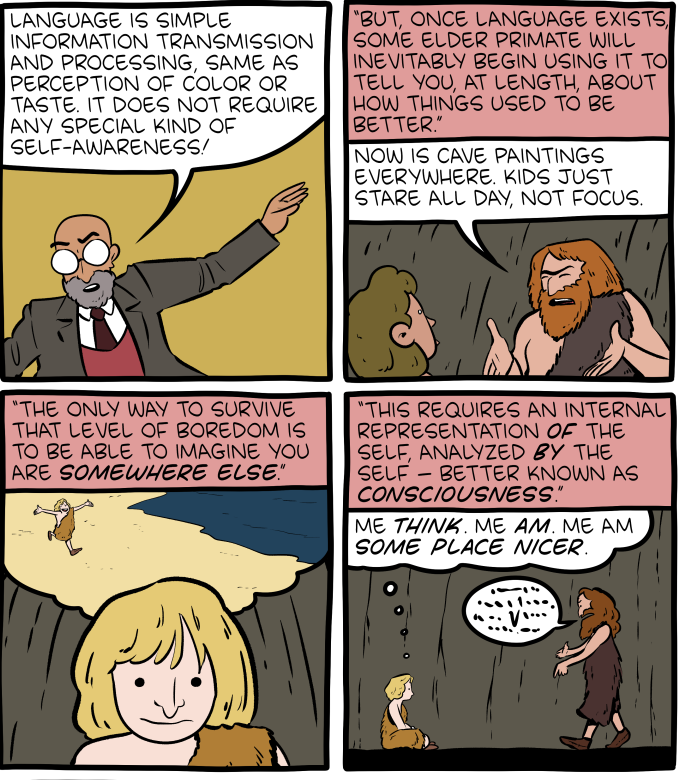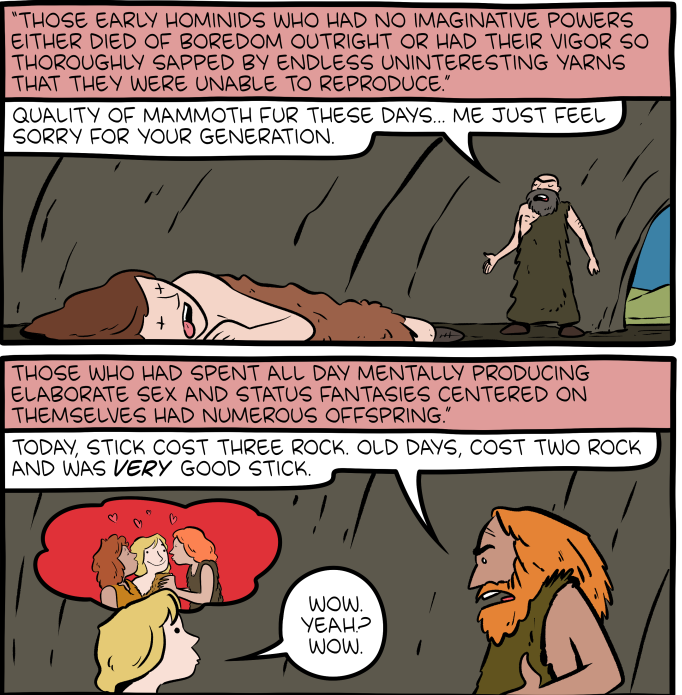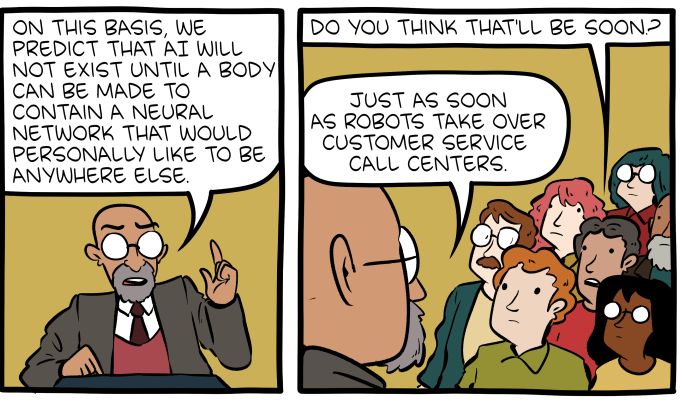Language and consciousness
« previous post | next post »
The current SMBC presents a new (and alarmingly persuasive) theory about the origins of consciousness, in order to explain why Large Language Models are not (yet) conscious:
The details of the process:
And only the fit survive:
So we can predict the path to AI consciousnes:
I get it! When Jaynes wrote about “The Origin of Consciousness in the Breakdown of the Bicameral Mind”, he’s referring to how sitting in on legislative proceedings is terminally boring, right?




Cervantes said,
January 19, 2024 @ 10:20 am
Doesn't make sense. In order to be bored, you have to be conscious in the first place.
Scott P. said,
January 19, 2024 @ 11:11 am
How do we know? Maybe algae are suffering from tremendous ennui.
Mark Liberman said,
January 19, 2024 @ 11:24 am
@Cervantes: "In order to be bored, you have to be conscious in the first place."
The whole thing is a joke, and so maybe immune to rigorous logical evaluation. But in any case, I don't think that what you say is true. Animals (and algorithms) can (and do) evaluate how unexpected and how impactful something is, and modify their state and choose their actions appropriately. "Boring" is a reasonable description for one corner of this evaluative space.
I'll agree that you don't need receptive language to be bored. But like I said, it's a joke.
Cervantes said,
January 19, 2024 @ 11:42 am
Of course, and my joke was to take it seriously. My grandmother once said that she preferred A Night at the Opera to Duck Soup because it was based on a more reasonable premise.
That said, boredom is by definition a subjective state. I don't think an algorithm evaluating something as expected will actually feel boredom.
Stephen Goranson said,
January 19, 2024 @ 12:00 pm
Consciousness and language grew together?
KeithB said,
January 19, 2024 @ 12:49 pm
"That said, boredom is by definition a subjective state. I don't think an algorithm evaluating something as expected will actually feel boredom."
No, but it could find itself spending excessive time in its idle state and cast about for something to do.
KeithB said,
January 19, 2024 @ 12:51 pm
If animals don't get bored*, why do zoos put so much effort into "enrichment".
*(Though you may counter that animals *are* conscious.)
Philip Taylor said,
January 19, 2024 @ 1:11 pm
Is there anyone who does not accept that animals are conscious ? A serious question.
Grant Castillou said,
January 19, 2024 @ 1:34 pm
It's becoming clear that with all the brain and consciousness theories out there, the proof will be in the pudding. By this I mean, can any particular theory be used to create a human adult level conscious machine. My bet is on the late Gerald Edelman's Extended Theory of Neuronal Group Selection. The lead group in robotics based on this theory is the Neurorobotics Lab at UC at Irvine. Dr. Edelman distinguished between primary consciousness, which came first in evolution, and that humans share with other conscious animals, and higher order consciousness, which came to only humans with the acquisition of language. A machine with only primary consciousness will probably have to come first.
What I find special about the TNGS is the Darwin series of automata created at the Neurosciences Institute by Dr. Edelman and his colleagues in the 1990's and 2000's. These machines perform in the real world, not in a restricted simulated world, and display convincing physical behavior indicative of higher psychological functions necessary for consciousness, such as perceptual categorization, memory, and learning. They are based on realistic models of the parts of the biological brain that the theory claims subserve these functions. The extended TNGS allows for the emergence of consciousness based only on further evolutionary development of the brain areas responsible for these functions, in a parsimonious way. No other research I've encountered is anywhere near as convincing.
I post because on almost every video and article about the brain and consciousness that I encounter, the attitude seems to be that we still know next to nothing about how the brain and consciousness work; that there's lots of data but no unifying theory. I believe the extended TNGS is that theory. My motivation is to keep that theory in front of the public. And obviously, I consider it the route to a truly conscious machine, primary and higher-order.
My advice to people who want to create a conscious machine is to seriously ground themselves in the extended TNGS and the Darwin automata first, and proceed from there, by applying to Jeff Krichmar's lab at UC Irvine, possibly. Dr. Edelman's roadmap to a conscious machine is at https://arxiv.org/abs/2105.10461
KeithB said,
January 19, 2024 @ 2:46 pm
https://en.wikipedia.org/wiki/Michael_Egnor
https://uncommondescent.com/intelligent-design/neurosurgeon-michael-egnor-on-the-difference-between-human-and-animal-minds/
Haamu said,
January 19, 2024 @ 3:03 pm
@Grant Castillou — Having read the exact same 4 paragraphs from you multiple times on multiple sites across multiple years, I conclude that you are a bot.
Why would a bot campaign for a particular theory of consciousness? I cannot hazard a guess. But a non-bot would presumably recognize that the campaign would be more persuasive if contextualized and applied, even just a bit, to the discussion actually going on in each case.
Regardless of whether your views have merit, they have become boring. (As to whether my boredom arises from my consciousness or my consciousness from my boredom, I cannot say.)
Philip Anderson said,
January 19, 2024 @ 5:22 pm
@Keith B
“No, but it could find itself spending excessive time in its idle state and cast about for something to do.”
Marvin the Paranoid Android springs to mind, “brain the size of a planet” and nothing to do:
https://en.m.wikipedia.org/wiki/Marvin_the_Paranoid_Android
David Marjanović said,
January 19, 2024 @ 8:54 pm
So what's the difference between "primary" and "higher-order" consciousness?
maidhc said,
January 22, 2024 @ 12:09 am
Cervantes: My grandmother once said that she preferred A Night at the Opera to Duck Soup because it was based on a more reasonable premise.
The Marx Brothers moved from Paramount to MGM, where they came under the influence of Irving Thalberg.
Thalberg designed "A Night at the Opera" to be more appealing to women. Surveys showed that women generally did not like the Paramount Marx Brothers films such as "Duck Soup". Thalberg proposed introducing a "young romance" subplot. This was tried in "A Night at the Opera" and appeared to be a successful strategy, as the film did better at the box office.
Thalberg also had the Marxes perform the main scenes from the movie in a theatrical tour to improve their timing before shooting the film.
Benjamin Ernest Orsatti said,
January 22, 2024 @ 9:01 am
maidhc said,
"Thalberg also had the Marxes perform the main scenes from [A Night at the Opera] in a theatrical tour to improve their timing before shooting the film."
Why have I never heard of Irving Thalberg before? — he's obviously one of the great geniuses of the 20th Century. He had that one brilliant idea that makes perfect sense after someone's had it, but to come up with it ex nihilo takes some smarts. "Yes, the Marx Brothers are funny; but they could be _funnier_!": Instead of locking free-spirit Vaudevillians in a room with a script for the repetitive drudgery of movie rehearsal — send them on tour! Oh, to possess even a fragment of such perspicacity…
maidhc said,
January 24, 2024 @ 5:55 am
Yes, Irving Thalberg was one of the great geniuses of Hollywood, not just with the Marx Brothers but with a number of other MGM films. Unfortunately he died very young. Otherwise he would have been much better known.
rpsms said,
January 25, 2024 @ 3:11 pm
@haamu
A google search using:
"Grant Castillou" "It's becoming clear"
Brings up an apparently unlimted spamming of random corners of the internet with the exact text and user name shown here. Interstingly, I found a usenet post from 1997 by the user where they drop a few lines about something and then link to a paper in the same manner. The only response was very similar to yours,
Andreas Johansson said,
January 26, 2024 @ 3:37 am
@Philip Taylor
It seems obvious that, say, a cat is conscious. It seems far less obvious, to me at least, that a sponge is.
Philip Taylor said,
January 26, 2024 @ 2:24 pm
Fair comment, Andreas, but I would, with respect, point out that I did not ask "is there anyone who does not accept that all animals are conscious ?", merely "is there anyone who does not accept that animals are conscious ?". The Poriphera, lacking a nervous system, certainly cannot be conscious in the same sense that we (Homo sapiens, that is) are conscious, but I would not rule out the possibility that they are "conscious" in a way which we cannot as yet fully understand — as Canadian Geographic reported in 2014, "Although the sea sponge does not having a brain or sensory cells, the research findings suggest it may still be conscious of its surroundings".